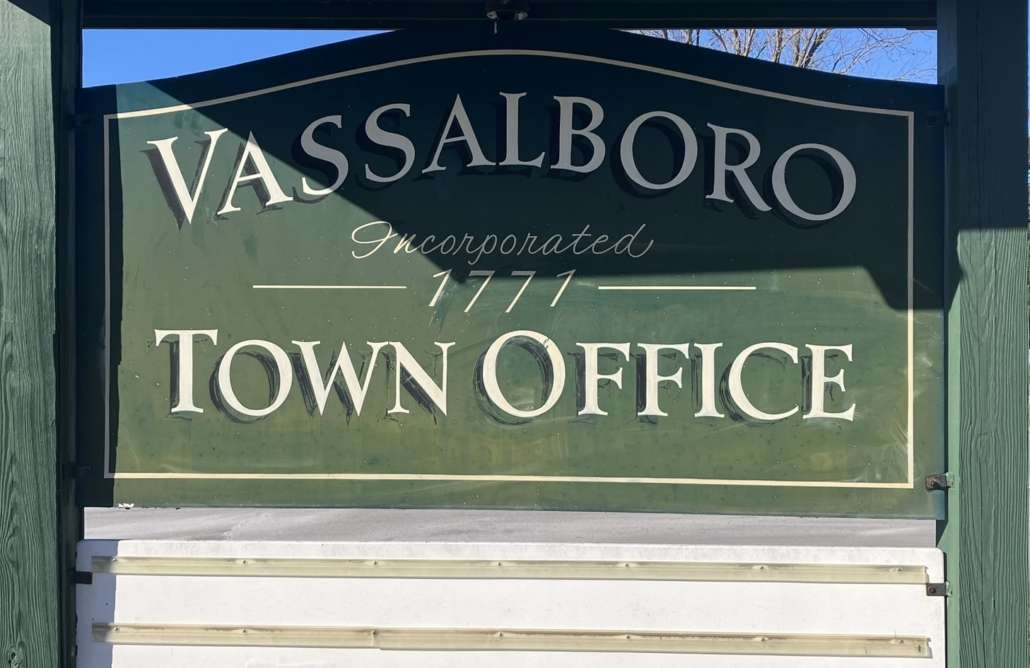Vassalboro first responders receive $17,500 grant from blue ribbon commission
 by Mary Grow
by Mary Grow
Money was a major theme at the July 25 Vassalboro select board meeting, and for once, some was coming in instead of going out.
Vassalboro First Responders Chief Dan Mayotte was the first person with good news (and a request): the First Responders recently received a $17,300 grant, part of the recommendations from the Blue Ribbon Commission the Maine legislature created in 2023.
Plans to use the money include providing tuition for members who want to get advanced EMT (Emergency Medical Technician) training, and paying a member to spend a few hours a week doing paperwork, checking gear and doing other managerial tasks.
Mayotte said Vassalboro has the most First Responders of any area town. With a successful group and a grant, he asked select board members to support an application to move to a higher license level, from EMT to Advanced EMT. Part of the grant money would be used for the application process and for some additional equipment.
The higher license would let members perform additional life-saving services when needed, for instance if an ambulance were delayed, Mayotte said.
He foresaw no additional major expenditures if the unit were licensed as Advanced EMT. He told Town Manager Aaron Miller the change would not affect insurance costs.
The two select board members present July 25, chairman Frederick “Rick” Denico, Jr., and Chris French, authorized Mayotte and Miller to work on getting the new license.
At the end of the select board meeting, Recreation Director Karen Hatch displayed another result of a successful grant: in the meeting room was one of the raised garden boxes that will be set up in front of the town office. The project is funded with a Community Challenge Grant from AARP (formerly the American Association of Retired Persons); see the July 18 issue of The Town Line, p. 8, for more information.
Between those two pieces of good news, Miller and board members talked about:
— The on-going multi-party discussion of the China Lake water level and the outlet dam in East Vassalboro;
— Plans to replace Dunlap Bridge on Mill Hill Road, an expensive project that involves the town and its engineering firm, Calderwood Engineering, of Richmond, and the state Department of Transportation; and
— Next steps in dealing with two foreclosed properties, at 14 Priest Hill Road and 159 Lombard Dam Road.
Board members approved Miller’s list of town manager’s appointments. They appointed Bruce Lancaster to the Vassalboro Trails Committee, and Jordan Cayouette as the Recreation Committee member heading the soccer program.
They agreed by consensus to offer for sale a 12-by-16-foot gazebo, bought by a past recreation director some years ago and never taken from its box and assembled. Miller recommended sale proceeds be set aside in a fund for a similar project should Hatch so recommend.
The manager reported that the Delta Ambulance board of directors is considering asking towns it serves for a 2025 fee of $35 per resident. No decision was made, he emphasized.
By town meeting vote, Delta is receiving $25 a head for fiscal year 2024, up from $15 in FY 2023. During budget discussions, there was talk of a possible 2025 fee as high as $45.
Miller reported on proposed measures to slow traffic approaching the East Vassalboro four corners, which he said should be in place by the end of August. The plan was worked out by the local East Vassalboro Village Project Team and the state Department of Transportation, whose cooperation Miller praised.
Also earning praise, from Miller and from public works department spokesman Brian Lajoie, was Lucas Striping, of Readfield, for donating pavement striping at the newly-paved Vassalboro Historical Society parking lot.
Lajoie told board members the public works department is seeking bids for its new building. He hopes the building will go up this fall.
The next regular Vassalboro select board meeting is scheduled for Thursday evening, Aug. 8.


 by The Town Line staff
by The Town Line staff
 The Sheepscot Lake Association will be hosting Maine Audubon Biologist Ethan Daly at their annual meeting Thursday, July 25, to discuss the Audubon’s Loon Restoration Project. Ethan Daly will be discussing Loon Restoration. Ethan grew up in New Hampshire and moved to Maine in 2024. He attended Boston College where he studied environmental science. He’s been working with Maine Audubon’s Loon Restoration Project since March and thoroughly enjoys monitoring loons and working with volunteers. Outside of work he enjoys hiking, cycling, and his guitar.
The Sheepscot Lake Association will be hosting Maine Audubon Biologist Ethan Daly at their annual meeting Thursday, July 25, to discuss the Audubon’s Loon Restoration Project. Ethan Daly will be discussing Loon Restoration. Ethan grew up in New Hampshire and moved to Maine in 2024. He attended Boston College where he studied environmental science. He’s been working with Maine Audubon’s Loon Restoration Project since March and thoroughly enjoys monitoring loons and working with volunteers. Outside of work he enjoys hiking, cycling, and his guitar.
 Over half a million dollars in miscellaneous payments
Over half a million dollars in miscellaneous payments

